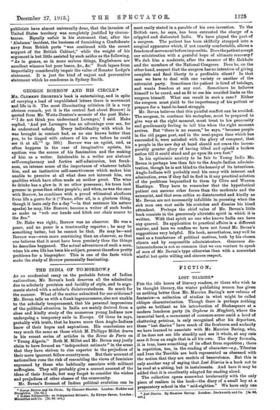GEORGE BORROW AND HIS CIRCLE.*
MR. CLEMENT SHORTER'S book is entertaining, and in spite of carrying a load of unpublished letters there is movement and life in it. The most illuminating criticism (it is a very obvious remark, yet it is the central fact about Borrow) is quoted from Mr. Watts-Dunton's memoir of the poet Hake : "'I do not think you understand Lavengro,' I said. Hake replied, 'And yet Lavengro has an advantage over me, for he understood nobody. Every individuality with which he was brought in contact had, as no one knows better than you, to be tinged with colours of his own before he could see it at all." (p. 390.) Borrow was an egoist, and, as often happens in the case of imaginative egoists, his egotism was the source of his fascination and the making of him as a writer. Intolerable in a writer are abstract self-complacency and furtive self-admiration, but frank- ness, an intense sense of the importance of whatever befalls him, and an instinctive self-assertiveness which makes him unable to perceive at all what does not interest him, are qualities which have often made an author great. The wine he drinks has a glow in it no other possesses; his trees look greener in prose than other people's ; and when, as was the case with Borrow, he combines with a proud whimsical aloofness from life a gusto for it (" Fame, after all, is a glorious thing, though it lasts only for a day "—in that sentence his nature speaks) be may, like Borrow, become a writer of such books as make us "rub our hands and bitch our chair nearer to the fire."
Dr. Hake was right; Borrow was no observer. He was a poser, and no poser is a trustworthy reporter ; he may be something better, but he cannot be that. He may be—and Borrow was—even more convincing than an observer, so that one believes that it must have been precisely thus the things he describes happened. The actual adventures of such a man, when his own life has been his subject, present therefore pretty problems for a biographer. This is one of the facts which make the study of Borrow perennially fascinating.


































 Previous page
Previous page